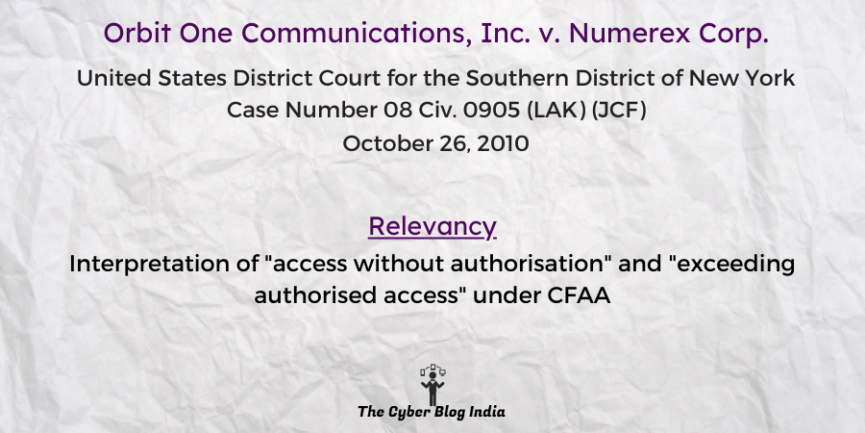Orbit One Communications, Inc. v. Numerex Corp.

Orbit One Communications, Inc. v. Numerex Corp.
271 F.R.D. 429
In the United States District Court for the Southern District of New York
Case Number 08 Civ. 0905 (LAK) (JCF)
Before Magistrate Judge J.C. Francis IV
Decided on October 26, 2010
Relevancy of the Case: Interpretation of “access without authorisation” and “exceeding authorised access” under CFAA
Statutes and Provisions Involved
- The Computer Fraud and Abuse Act, 18 U.S.C. § 1030
Relevant Facts of the Case
- David Ronsen created Orbit One Communications in 2000. The plaintiff company manufactured satellite-based tracking devices.
- In 2005, Rosen hired Naden as CTO with 6% equity and Rosenzweig as VP of development with 10% equity. Rosen retained 84% equity.
- In 2006, Numerex showed interest in buying Orbit and thus entered into an Asset Purchase Agreement (APA) on July 31, 2007. The APA stated that all the plaintiff’s assets would be transferred to Numerex for $5.5 million.
- Rosen, Naden, and Rosenzweig entered into an employment contract with Numerex, where they agreed to run the defendant’s satellite division (formerly Orbit One).
- In April 2008, Ronsen resigned from his employment at Numerex, followed by the resignations of Naden and Rosenzweig. Numerex sued Rosenzweig and Naden, alleging they stole proprietary information upon leaving. They filed counter-claims stating that Numerex violated the APA and their employment agreements.
- Eventually, Rosen, Naden, and Rosenzweig filed an action before the District Court.
Prominent Arguments of the Counsels
- The plaintiff’s counsel contended that the defendant had no evidence to prove they had access to their computers without authorisation. It was the plaintiff’s ordinary course of duty to access the defendant’s information. Moreover, the defendant cannot term Rosen’s resignation as a breach of his employment contract as the agreement stated he could quit for good reasons. The defendant’s breach of obligations towards him can be a good reason for leaving.
- The defendant’s counsel argued that the plaintiff breached the APA as they failed to operate in accordance with the business plan. The plaintiff could not support marketing and other departments of the company. The plaintiff has violated CFAA as they defrauded the defendant by accessing a protected computer without authorisation. They downloaded confidential and proprietary information in the defendants’ computer system and removed such information to compete with the defendant.
Opinion of the Bench
- Since the former owners of Orbit One were employed with the defendant, they had authorised access to the defendant’s systems.
- The plaintiff did not engage in model preservation of electronically stored information in this case. However, they are not liable for spoliation sanctions, much less a severe sanction such as an adverse interference. There is insufficient evidence that any relevant information has been destroyed.
Final Decision
- The court granted the suit in the plaintiffs’ favour and denied Numerex’s motion for sanctions.
